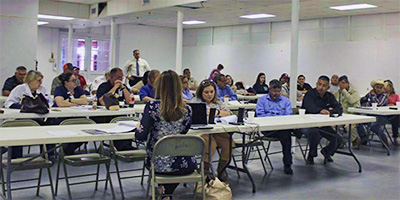by Melissa Cantu Trevino, Alice Echo News Journal
The Jim Wells County’s first Local Emergency Planning Committee (LEPC) kicked off Thursday with gathering at the fairgrounds of first responders, county and city officials.
 LEPC is a partnership between citizens, local government and industry to enhance hazardous materials preparedness. LEPCs are mandated organizations that consist of emergency responders, industry, government, education, media and community groups.
LEPC is a partnership between citizens, local government and industry to enhance hazardous materials preparedness. LEPCs are mandated organizations that consist of emergency responders, industry, government, education, media and community groups.
“This meeting with different entities is to see how the county can enhance local community emergency responders, city and county officials, as well as hospitals and schools,” said County Judge Pete Trevino, JWC LEPC’s president. “Michelle Joseph is giving us a guide on how to kickoff our own committee. Having everyone in the same room gives us a chance to know exactly what everyone has to contribute.”
The county received a $87,000 grant to enhance the local program, Trevino said.
During the meeting, an open discussion platform gave attendees the chance to ask how the LEPC can serve the residents of JWC in case an emergency should arise.
The first meeting was hosted by Joseph, owner of Soteria Solutions in Dallas, which is the nation’s leading authority on emergency response planning for county and city governments, according to the company’s website. Soteria Solutions provides its clients with expertise and guidance for topics such as LEPCs or local emergency planning committees, fire service strategic and training planning, and risk assessment and reduction.
LEPCs were established to carry out the requirements of the federal Emergency Planning and Community Right-to-Know Act (EPCRA), also known as Superfund Amendments and Reauthorization Act (SARA) and related regulations for emergency response planning.
The EPCRA was created to help communities plan for chemical emergencies. EPCRA requires state and local governments to use this information to prepare their community from potential risks such as knowing who in the community had what resources needed to combat an emergency. The EPCRA was passed in 1986 in response to concerns that regarded the environmental and safety hazards posed by the storage and handling of toxic chemicals.

